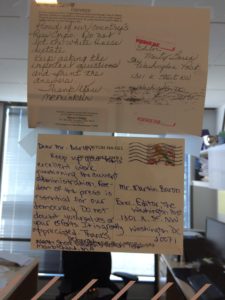
The Washington Post executive editor, Marty Baron,
hang on his office walls.
On a warm October afternoon, as Marty Baron, the venerated editor of The Washington Post, spoke with our fellowship class, I felt admiration, and envy.
Baron outlined how his legacy newsroom was embracing technological changes and had garnered over a million digital-only subscribers earlier this year. The paper’s willingness to adapt, he stressed, was underpinned by its foundational mission of striving for the truth.
Over the past year, The Post has published an impressive stream of stories investigating President Donald Trump’s election campaign, his family members, his business interests and his administration. Earlier that afternoon, as we toured the Post’s newsroom, the outer glass walls of Baron’s office, plastered with grateful letters from readers, captivated me. One note read, “Dear Mr Baron, [… ] Without the hard work of your reporters, our situation today would be so much more dire.” Another said, “Keep asking the important questions. And print the answers.”
Later, as Baron spoke to us, I wondered if in India, an editor like him could survive the political and economic powers that stifle journalism’s core function – “ask the important questions, print the answers.”
Like President Trump, India’s Prime Minister Narendra Modi loathes the press. Unlike Trump, Modi chooses complete disengagement. He has not held a single press conference in 40 months of holding office. A senior minister in his cabinet coined the term “presstitutes” for journalists asking inconvenient questions. Most legacy newsrooms in India are fearful and self-censor. Last month, the exit of the editor-in-chief of The Hindustan Times, my former newspaper and a leading national daily, was preceded by a meeting between Modi and the paper’s proprietor. The editor lasted in the job for little over a year. Among the paper’s projects, which reportedly upset the government, was “Hate Tracker” – a digital database documenting India’s rising hate[A1] crimes, including the lynching of religious minorities.
Newsrooms – mostly small, alternative media, and nascent, digital outlets – that are putting up a fight are especially under threat. On October 5, while we were in D.C., Gauri Lankesh, a Bangalore-based editor of a small newspaper, was posthumously given the Anna Politkovskaya Award, established in memory of the slain Russian journalist to honor a female human rights defender. A month ago, assailants had fatally shot Lankesh outside her home as she returned from work.
The day our trip ended, The Wire, a fledgling, resource-strapped website in India, reported how the turnover of a firm headed by Jay Amit Shah, the son of the President of the ruling Bharatiya Janata Party (BJP), had increased 16,000 times over since the BJP took power in 2014. The BJP and Shah did not challenge a single fact in the story. Instead, they have filed a criminal defamation suit of 100 crore Rupees (over $15 million) against The Wire’s editors and the reporter.
I did not need dispatches from home to remind me of the powerful forces against which Indian journalists persevere. On our trip’s penultimate day, I wandered through the floors of the Newseum, lingering at the Journalists Memorial – a tribute to over 2,000 journalists, killed in the line of duty. Its centerpiece was a towering panel with hundreds of photographs of slain reporters. The collage of faces from around the world was heartbreaking, yet deeply inspiring.
In the memorial’s section titled “Stories of the Fallen – 2016”, the profiles included Karun Misra. The exhibit recorded that Misra, the 32-year-old bureau chief of a Hindi daily in north India, “had received death threats, and refused bribes, designed to deter him from reporting on illegal mining” before being gunned down last February.
I recalled a quote displayed prominently at The Washington Post newsroom: “There is only one good reason to enter journalism. When we do our job, we can make a difference.” The fellowship trip was a powerful reminder of why we must persist.
Chitrangada Choudhury is a 2018 Knight-Wallace Fellow and an independent multimedia journalist based in the eastern Indian state of Orissa.
